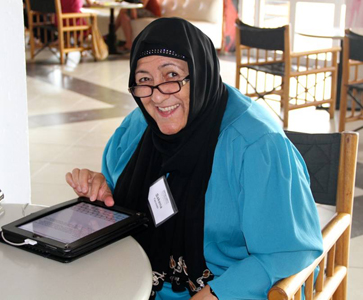No one has done more for Afghan women and children than Sakena Yacoobi. “Lessons in Courage,” was the title of a spring 2010 article SSIR ran about Yacoobi, and her continuing courage in the face of increasing violence in Afghanistan remains almost impossible to imagine.

I was very fortunate to be able to spend time with Yacoobi last month at the Opportunity Collaboration, a convening on global poverty alleviation held in Mexico. She caught me up on the current situation in Afghanistan and her work at the Afghan Institute of Learning (AIL). Yacoobi founded AIL in 1995 to provide teacher training to Afghan women, support education for boys and girls, and offer health education to women and children. About 200,000 students graduate every year from AIL’s programs, and Yacoobi estimates AIL has impacted 8.5 million Afghans. Yacoobi is the recipient of dozens of humanitarian, social entrepreneurship, and leadership awards for her incredible work over the last two decades.
The day Yacoobi and I met, it was a humid 90 degrees, but Yacoobi was wearing a hijab and a long, beautifully embroidered dark Afghan dress. She lit up with passion when talking about the progress being made and the hope of rebuilding Afghanistan. In every word she spoke, she was tireless and unwavering in her commitment to the people of Afghanistan. But at the same time, she seemed weary. She travels the world about 40 percent of her time, stop after stop, building support for AIL and change in Afghanistan. At home in Afghanistan, she works every day to make life better while surrounded by violence and uncertainty. Rebuilding Afghanistan is her life’s pursuit.
Are you enjoying this article? Read more like this, plus SSIR's full archive of content, when you subscribe.
Yacoobi focused in on the improvements she’s seen over the last two years, her workshops for youth to engage them in civil society, and renewing her people’s connection to the earth.
“Women’s lives are changing rapidly for the good,” she said. “It’s changed 180 degrees. Women are going into professions of all kinds. But the women of Afghanistan still need the international community to back them up. It takes awhile—Afghanistan has been at war 30 years. Everything cannot be changed right away.”
“Afghanistan is doing better, the villages are cleaner, people are healthier, and people know more about hygiene and reproductive health. Now we need infrastructure support, and we need to develop our civil society.” On the other hand, she added, “security is worse this year than last year. I have to just ignore the whole thing as otherwise I couldn’t function.”
Yacoobi has been holding workshops on democracy, leadership, and peace, getting youth involved in civil society. “A highlight of my life is my emerging youth group,” Yacoobi told me. She recently took 25 students, ages 18-25, to a peace conference in India. Now the group meets once a month for discussions. Each student was asked to bring two others, and the group has swelled to over 200.
Yacoobi also spoke about wanting to work with young people to bring back the connection between the Afghan people and nature. “I feel strongly that we are living too separate from nature; we are disconnected from the soil.” Yacoobi said. “The soil has been so abused, by landmines, suicide bombers, and many things. The dirt is dead.” She cited the important teaching of 13th century poet Rumi, who wrote of this connection and the importance of “love, tolerance, wisdom, respect, and forgiveness.”
Yacoobi is tired of concentrating on the negative. “I love Afghanistan. I love the women and children of Afghanistan. I work with civil society, and I am not interested in politics. Afghanistan is still insecure; we still have war. But the best thing for me is to concentrate and continue with what I am doing.”
Support SSIR’s coverage of cross-sector solutions to global challenges.
Help us further the reach of innovative ideas. Donate today.
Read more stories by Regina Ridley.

